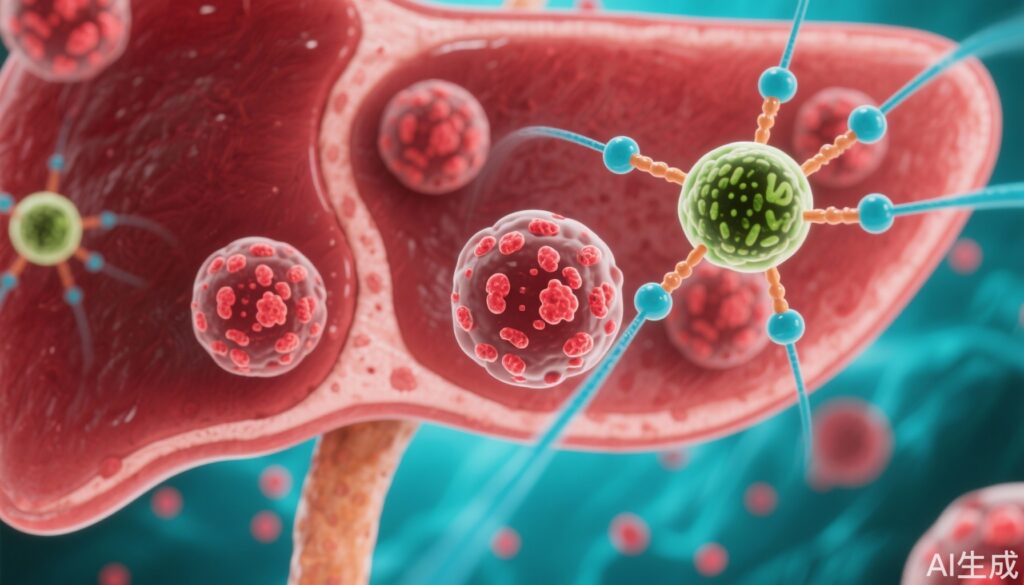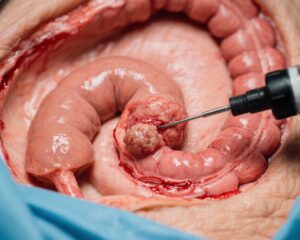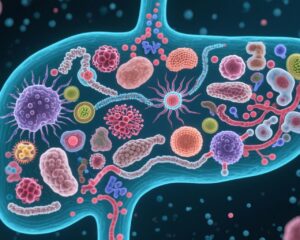Highlight
1. SCG101 is an autologous T-cell therapy engineered to target HBV using a high-affinity natural T-cell receptor, specifically for HBV-related HCC.
2. In a first-in-human investigator-initiated trial, SCG101 showed profound T-cell expansion, rapid and substantial HBsAg reduction, and objective tumor responses in heavily pretreated patients.
3. Treatment-related toxicities including transient ALT elevation and cytokine release syndrome were manageable and non-dose-limiting.
4. Durable complete remission was observed in one patient, with ongoing progression-free survival at 27 months, highlighting potential for long-term disease control.
Study Background and Disease Burden
Hepatocellular carcinoma (HCC) is a leading cause of cancer-related mortality worldwide, often arising in the context of chronic hepatitis B virus (HBV) infection. Chronic HBV infection persists in approximately 250 million individuals globally, and HBV-related HCC remains a major clinical challenge due to limited curative options for advanced disease stages and the virus’s contribution to tumorigenesis. Current systemic therapies for advanced HBV-HCC, including tyrosine kinase inhibitors and immune checkpoint inhibitors, provide modest survival benefits. There is an urgent unmet need for targeted immunotherapies that can address both the viral etiology and the malignant hepatocytes directly. SCG101, an autologous T-cell receptor-engineered T-cell therapy targeting HBV antigens presented by tumor cells, is designed to harness the immune system’s ability to specifically eliminate HBV-infected malignant hepatocytes, offering a novel therapeutic approach in this setting.
Study Design
This investigator-initiated, interventional trial enrolled six patients with advanced HBV-related HCC characterized by human leucocyte antigen (HLA)-A*02:01 positivity, serum hepatitis B surface antigen (HBsAg) positivity, and hepatitis B e antigen negativity. All patients had failed between one and three prior systemic therapies. The study applied SCG101 dosing at 5×107 or 1×108 TCR-T+ cells/kg, administered three days following lymphodepletion, to facilitate engraftment and expansion. The primary assessments included safety, pharmacokinetics and pharmacodynamics of T-cell expansion, viral activity as reflected by serum HBsAg reduction, and antitumour efficacy evaluated by modified Response Evaluation Criteria in Solid Tumours (mRECIST). Follow-up extended to a median of 10.9 months, allowing evaluation of durability and survival outcomes.
Key Findings
Within one week after infusion, all treated patients exhibited a significant yet transient elevation in alanine aminotransferase (ALT), indicative of hepatic immune activation and possibly on-target effects against HBV-infected hepatocytes. Peripheral blood analysis demonstrated a robust expansion of infused T cells, with a mean increase of 76±57 fold. Importantly, no neurotoxicity events were reported; however, cytokine release syndrome (CRS) occurred in all patients, reaching grade 3 in some cases. These adverse events were non-dose-limiting and managed effectively with corticosteroids, anti-IL-6 therapy, and vasopressors when needed.
Pharmacodynamically, SCG101 elicited a marked antiviral effect, reducing serum HBsAg levels by an average 1.96 log10 within two weeks, a significant decline illustrating potent viral antigen clearance. Tumor response evaluation showed objective tumor shrinkage in three of six patients with best reductions of -19.5%, -74.6%, and -100% in target lesion size. Remarkably, one patient achieved complete remission of target lesions, remaining progression-free at 27 months post-therapy. Another patient experienced durable remission lasting beyond six months. At data cutoff, three patients died from disease progression and one was lost to follow-up, highlighting challenges in this advanced population.
Expert Commentary
SCG101 exemplifies a cutting-edge personalized immunotherapeutic strategy leveraging T-cell receptor specificity against HBV epitopes, addressing both the causative virus and the malignancy. The marked T-cell expansion and significant HBsAg decline provide direct evidence of on-target engagement. The observed ability to induce deep tumor responses and durable remissions in this heavily pretreated cohort represents an important advance over conventional treatments. While cytokine release syndrome is an anticipated class effect of T-cell therapies, the manageable nature in this study supports feasibility of SCG101 administration with appropriate supportive measures.
Limitations include the small sample size and lack of a control arm, necessitating further studies to validate efficacy and safety across broader populations and diverse HLA types. Potential challenges include antigen loss variants, liver immune microenvironment complexities, and integration with existing therapies such as antiviral nucleos(t)ide analogues and checkpoint inhibition. Mechanistic investigations into T-cell persistence, exhaustion, and tumor microenvironment interactions will be crucial for optimizing therapeutic durability.
Conclusion
SCG101 TCR-T therapy demonstrates promising antiviral and antitumour activities in patients with advanced HBV-related HCC refractory to standard treatments. The safety profile is manageable, and the profound drops in serum HBsAg alongside notable tumor regression events underscore its on-target mechanism. These encouraging preliminary results warrant expanded clinical development and support SCG101 as a potential novel modality for a high unmet need population, potentially shifting treatment paradigms in HBV-driven liver cancer.
References
Wu X, Quan D, Li W, Wisskirchen K, Wu W, Zhou Y, Liu YP, Wan X, Wang X, Zhang X, Yang L, Zheng M, Zhang K, Protzer U, Du S, Qu X. Clinical results of an HBV-specific T-cell receptor-T-cell therapy (SCG101) in patients with HBV-related hepatocellular carcinoma treated in an investigator-initiated, interventional trial. Gut. 2025 Aug 22:gutjnl-2025-335456. doi: 10.1136/gutjnl-2025-335456. Epub ahead of print. PMID: 40803751.
European Association for the Study of the Liver. EASL Clinical Practice Guidelines: Management of hepatocellular carcinoma. J Hepatol. 2018 Jul;69(1):182-236. doi: 10.1016/j.jhep.2018.03.019.
Revill PA, Chisari FV, Block JM, et al. A global scientific strategy to cure hepatitis B. Lancet Gastroenterol Hepatol. 2019 Dec;4(12):545-558. doi:10.1016/S2468-1253(19)30101-3.



